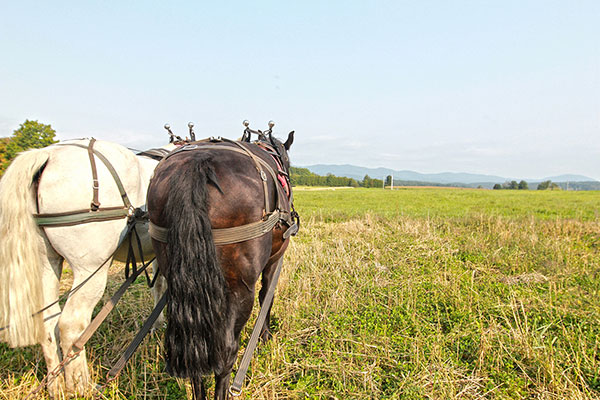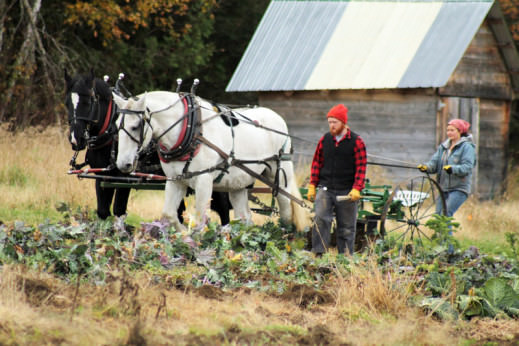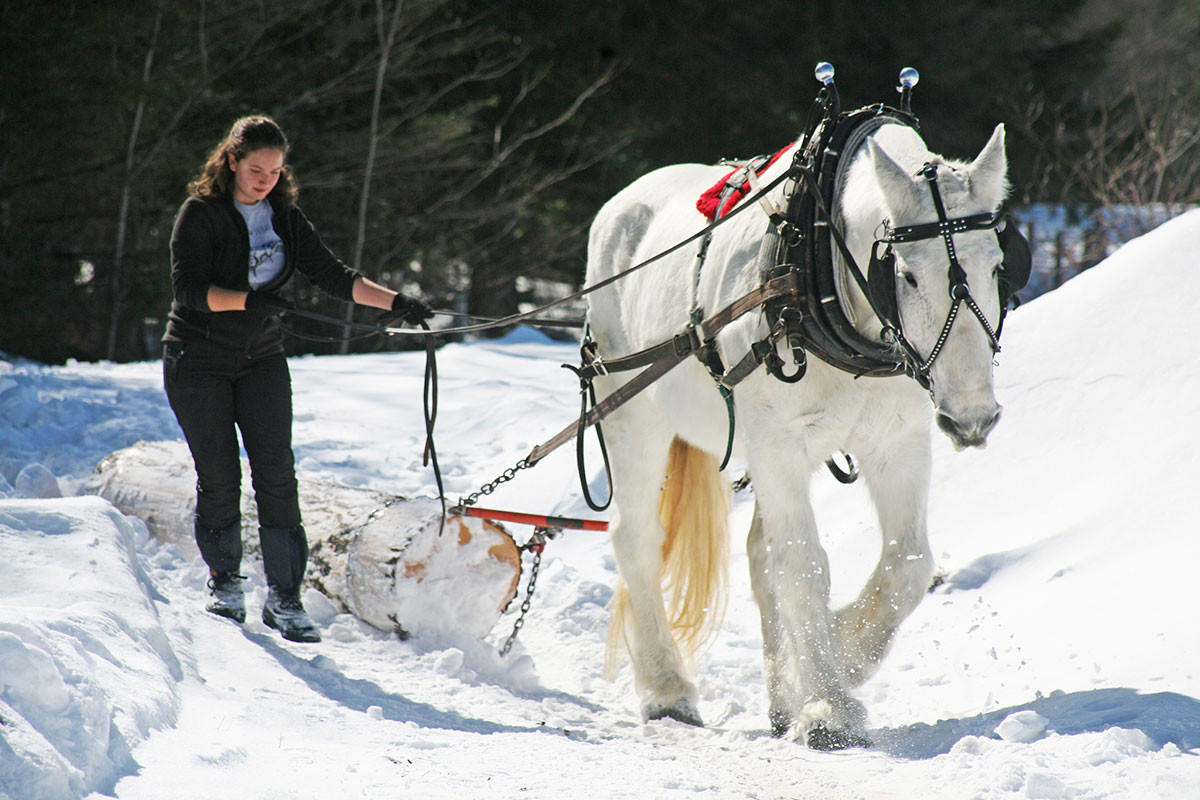Want to Master Draft-Horse Farming? Sterling College’ll Teach You How
Vermont’s Sterling College offers the first 15-credit Draft Horse Management minor of any accredited university stateside.
Thomas grew up in an Oklahoman dirt farming family, but after years removed from the land, he didn’t know his life’s work would go back to it. Seventeen years ago, Sterling College was in the process of transitioning from a two-year to a four-year school with major tracks like Sustainable Food Systems and Ecology, and he was hired to find a use for the two draft horses sitting idly on campus.
“The draft horse program started in the ’80s, but its presence on campus had dropped quite a bit by the time I arrived,” Thomas says, explaining why the horses had essentially been left without work. “My focus became resurrecting the program, but more importantly integrating it into the whole farm system. The horse program shouldn’t be viewed as separate from the ag program, but instead imbedded deeply within it.”

In the years since his 1998 arrival, the draft-horse curriculum evolved from one broad overview course into a 15-credit Draft Horse Management minor. Students first focus on the mechanics involved in working with one horse, covering care, control, harnessing, and driving principles. Then, they learn to put the horses to work – or rather, as sustainable agriculture major GÁ¶ran Johanson says, “to work with the horses to do the work, rather than using the horses to do the work.”
Students like Johanson work with the four horses – Rex, Babe, Daisy, and Belle; three Percherons and one Belgian – to plow the college’s organic farm, to extract timber from the Forestry program’s woodlot, and to haul syrup during maple season. About 10 percent of Sterling’s 125-person student body are working toward a a Draft Horse Management minor, and 32 percent are required to take the program’s introductory course as part of the Sustainable Agriculture curriculum. Not just a teaching tool, the horses are an integral part of campus life that most everyone interacts with in some way, whether or not they’re working toward the minor themselves.
“Everything we need to do to manage our land, we look for ways for the horses to be part of it,” says Thomas.
Compared to conventional tractor farming, working with draft horses has its drawbacks. Though Thomas says horses are cheaper to maintain than large tractors, the amount of land tractors can cover and the amount of income they bring in are often far greater than what an animal can do. Draft horses present limitations tractor farmers needn’t even consider. “If my horses can’t pull through heavy wet soil, then I probably can’t farm that piece of land,” he says. “With a tractor, you just give it a little more throttle and off you go. If I hit a stone while plowing, I have to stop, dig the stone out of my plow, and haul it over to the edge of my property. With a tractor, again, you turn up the throttle, blast the A/C and the radio, and go a little faster.”
For Thomas and his students, however, the perks far outweigh the drawbacks. Draft-horse farming is about cultivating a symbiotic relationship with the land. “It allows me to have a very intimate relationship with every inch of my land: I see it, I know it. If I’m using a tractor, I’m driving over my land rather than working with it,” says Thomas.
And unlike tractors, horses aren’t powered by diesel fuel. They’re powered by grass.

“Our horses eat only hay, and all of the haying is done with their help. We’re able to produce the feed that’ll sustain them all year using them as the power source,” says Johanson. “And when they’re done, we’re able to utilize what comes out of their rear end as the nutrients for the crops. It’s a closed loop system. Ecologically, that’s awesome.”
This responsibility is reflected in programs throughout Sterling, attracting students who wish to embrace a sustainable future through farming. “We do one thing here, and that’s educate stewards of the environment,” says Christian Feuerstein, Sterling’s communications director. “Everything we do, from our food systems classes to the draft horse program, deals with how we interact with the environment.”
At the end of the day, Thomas says, he sleeps better knowing that he has a sound relationship with his land and his animals. And his students, like Johanson, are happy to be learning from him: “He’s as patient with his students as he is with his horses, and that creates a learning atmosphere for all of us – the students, and the horses.”
For more on the Sterling College, their Draft Horse Management minor, and other tracks of study, visit www.sterlingcollege.edu.
Follow us

This work is licensed under a Creative Commons Attribution-NoDerivatives 4.0 International License.
Want to republish a Modern Farmer story?
We are happy for Modern Farmer stories to be shared, and encourage you to republish our articles for your audience. When doing so, we ask that you follow these guidelines:
Please credit us and our writers
For the author byline, please use “Author Name, Modern Farmer.” At the top of our stories, if on the web, please include this text and link: “This story was originally published by Modern Farmer.”
Please make sure to include a link back to either our home page or the article URL.
At the bottom of the story, please include the following text:
“Modern Farmer is a nonprofit initiative dedicated to raising awareness and catalyzing action at the intersection of food, agriculture, and society. Read more at <link>Modern Farmer</link>.”
Use our widget
We’d like to be able to track our stories, so we ask that if you republish our content, you do so using our widget (located on the left hand side of the article). The HTML code has a built-in tracker that tells us the data and domain where the story was published, as well as view counts.
Check the image requirements
It’s your responsibility to confirm you're licensed to republish images in our articles. Some images, such as those from commercial providers, don't allow their images to be republished without permission or payment. Copyright terms are generally listed in the image caption and attribution. You are welcome to omit our images or substitute with your own. Charts and interactive graphics follow the same rules.
Don’t change too much. Or, ask us first.
Articles must be republished in their entirety. It’s okay to change references to time (“today” to “yesterday”) or location (“Iowa City, IA” to “here”). But please keep everything else the same.
If you feel strongly that a more material edit needs to be made, get in touch with us at [email protected]. We’re happy to discuss it with the original author, but we must have prior approval for changes before publication.
Special cases
Extracts. You may run the first few lines or paragraphs of the article and then say: “Read the full article at Modern Farmer” with a link back to the original article.
Quotes. You may quote authors provided you include a link back to the article URL.
Translations. These require writer approval. To inquire about translation of a Modern Farmer article, contact us at [email protected]
Signed consent / copyright release forms. These are not required, provided you are following these guidelines.
Print. Articles can be republished in print under these same rules, with the exception that you do not need to include the links.
Tag us
When sharing the story on social media, please tag us using the following: - Twitter (@ModFarm) - Facebook (@ModernFarmerMedia) - Instagram (@modfarm)
Use our content respectfully
Modern Farmer is a nonprofit and as such we share our content for free and in good faith in order to reach new audiences. Respectfully,
No selling ads against our stories. It’s okay to put our stories on pages with ads.
Don’t republish our material wholesale, or automatically; you need to select stories to be republished individually.
You have no rights to sell, license, syndicate, or otherwise represent yourself as the authorized owner of our material to any third parties. This means that you cannot actively publish or submit our work for syndication to third party platforms or apps like Apple News or Google News. We understand that publishers cannot fully control when certain third parties automatically summarize or crawl content from publishers’ own sites.
Keep in touch
We want to hear from you if you love Modern Farmer content, have a collaboration idea, or anything else to share. As a nonprofit outlet, we work in service of our community and are always open to comments, feedback, and ideas. Contact us at [email protected].by Gabrielle Saulsbery, Modern Farmer
December 16, 2015
Modern Farmer Weekly
Solutions Hub
Innovations, ideas and inspiration. Actionable solutions for a resilient food system.
ExploreExplore other topics
Share With Us
We want to hear from Modern Farmer readers who have thoughtful commentary, actionable solutions, or helpful ideas to share.
SubmitNecessary cookies are absolutely essential for the website to function properly. This category only includes cookies that ensures basic functionalities and security features of the website. These cookies do not store any personal information.
Any cookies that may not be particularly necessary for the website to function and are used specifically to collect user personal data via analytics, ads, other embedded contents are termed as non-necessary cookies.
